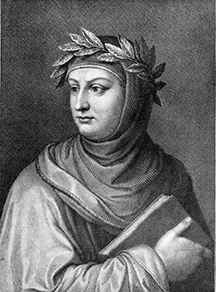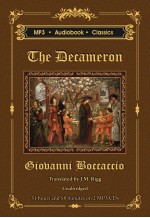Giovanni Boccaccio
 |
Giovanni Boccaccio (1313 – December 21, 1375) was an Italian Renaissance author and humanist best known as author of The Decameron and Of Famous Women. He was born and raised in Florence, where his father was a merchant employed by the Compagnia del Bardi, the largest international banking and trading firm of the day; his mother is unknown, and it is likely he was born out of wedlock. In his early teens the family moved to Naples when his father was made head of a bank. He studied law, science and literature and was introduced to the Neapolitan nobility and court. He found his vocation as a poet in Naples and produced numerous works. Political tensions between Naples and Florence forced return to Florence in 1341, where he continued to write amid the difficulties of his father’s bankruptcy and the takeover of the Florentine government by the popolo minuto, which diminished the influence of the wealthy and the nobility. Boccaccio avoided the Black Death of 1348, which killed 75% of the Florentine population, by spending time in Ravenna. His father, Minister of Supply for Florence during the epidemic, died in 1349, which forced Giovanni into a more public role as head of the family. He started work on the Decameron in 1349 and finished it in 1352. In 1350 he became involved with the government, representing Florence on missions to Rome, Milan, Avignon and Brandenburg. He was delegated to host Petrarch during his visit to Florence in 1350, which resulted in an enduring friendship and inspired the Genealogia deorum gentilium, a key reference work on classical mythology. Scholars note a change in his style in 1350’s away from praise of women and love to a more classical and stringent tone, likely due to declining health and disappointments in love. Politics forced him to leave Florence in 1361, a period marked by a visit with Petrarch at his Palazzo Molino in Padua. He returned to Florence in 1365, representing the city on missions to the papacy and to Venice and Naples. He produced his biographies of famous women and men, a dictionary of geographical allusions in the classics, and a series of lectures of Dante. At his death in 1375 his collected works were given to the monastery of San Spirito in Florence, where they remain today. |
The Decameron
In a secluded villa outside Florence, seven women and ten men, seeking shelter from the plague, answ..
$14.99
Showing 1 to 1 of 1 (1 Pages)

